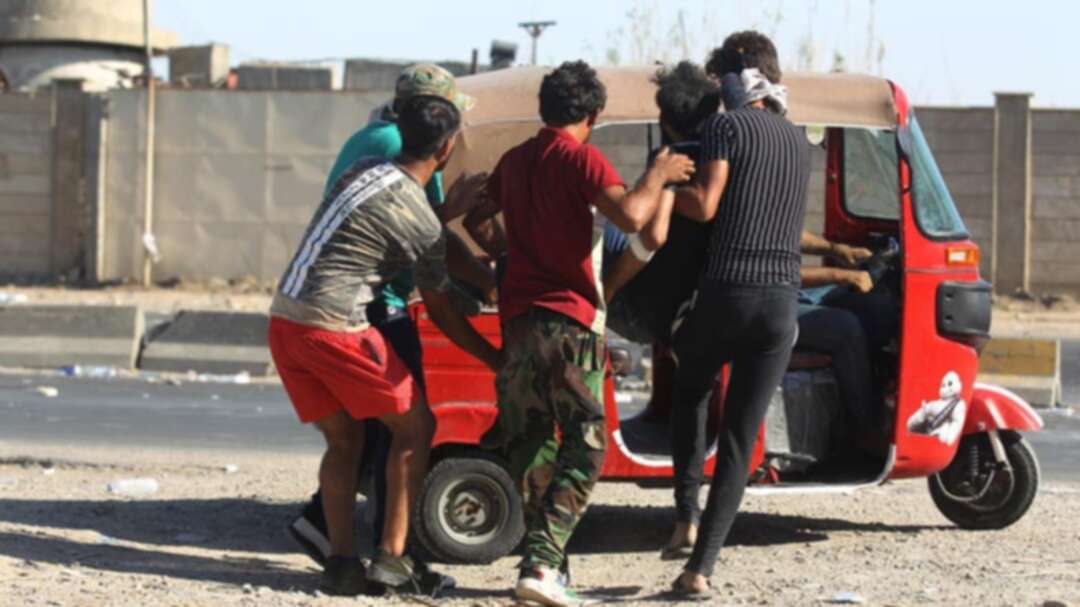-
‘Unidentified snipers’ kill four in Baghdad: Iraqi security forces

Iraqi security forces said “unidentified snipers” killed four people across the capital Baghdad on Friday, the fourth day of violent anti-government protests.
A statement said the four were two members of the security forces and two civilians, bringing the death toll since protests began on Tuesday to 44, including six security forces.
Security forces opened fire directly at hundreds of anti-government demonstrators Friday in central Baghdad, killing at least 10 protesters and injuring dozens, hours after Iraq’s top Shiite cleric warned both sides to end four days of violence “before it’s too late.”
The violence showed both sides to be unwilling to back down from the unrest that marks the most serious challenge for Iraq since the defeat of ISIS two years ago.
In a televised address to the country early Friday, Prime Minister Adel Abdul-Mahdi said the protesters’ “legitimate demands” had been heard, adding that the security measures used against the demonstrations were like “bitter medicine” that needs to be swallowed. Authorities have shut off the internet and imposed an around-the-clock curfew in the capital in a desperate attempt to curb the rallies.
The protesters, many of whom had camped on the streets overnight, gathered before noon near Tahrir Square in defiance of Abdul-Mahdi’s call and the curfew announced a day earlier. Around sunset, following Friday prayers, the number of protesters grew to more than 1,000 as security forces opened fire in side streets to prevent more people from reaching the square.
Since the spontaneous rallies began Tuesday, security forces have fired live rounds and tear gas every day to disperse them in multiple provinces. The mostly young demonstrators are demanding jobs, improved services like electricity and water, and an end to corruption in the oil-rich country.
Iraq’s most senior Shiite spiritual leader Grand Ayatollah Ali al-Sistani urged both sides to end the violence, and he blamed politicians, particularly lawmakers, for failing to enact promised reforms on the economy and corruption. The comments were his first since the protests began, and many across Iraq’s predominantly Shiite south had looked to the influential cleric for guidance.
The mostly leaderless protests have been concentrated in Baghdad and the south, bringing out jobless youths and university graduates who are suffering under an economy reeling from graft and mismanagement.
You May Also Like
Popular Posts
Caricature
BENEFIT Sponsors BuildHer...
- April 23, 2025
BENEFIT, the Kingdom’s innovator and leading company in Fintech and electronic financial transactions service, has sponsored the BuildHer CityHack 2025 Hackathon, a two-day event spearheaded by the College of Engineering and Technology at the Royal University for Women (RUW).
Aimed at secondary school students, the event brought together a distinguished group of academic professionals and technology experts to mentor and inspire young participants.
More than 100 high school students from across the Kingdom of Bahrain took part in the hackathon, which featured an intensive programme of training workshops and hands-on sessions. These activities were tailored to enhance participants’ critical thinking, collaborative problem-solving, and team-building capabilities, while also encouraging the development of practical and sustainable solutions to contemporary challenges using modern technological tools.
BENEFIT’s Chief Executive Mr. Abdulwahed AlJanahi, commented: “Our support for this educational hackathon reflects our long-term strategic vision to nurture the talents of emerging national youth and empower the next generation of accomplished female leaders in technology. By fostering creativity and innovation, we aim to contribute meaningfully to Bahrain’s comprehensive development goals and align with the aspirations outlined in the Kingdom’s Vision 2030—an ambition in which BENEFIT plays a central role.”
Professor Riyadh Yousif Hamzah, President of the Royal University for Women, commented: “This initiative reflects our commitment to advancing women in STEM fields. We're cultivating a generation of creative, solution-driven female leaders who will drive national development. Our partnership with BENEFIT exemplifies the powerful synergy between academia and private sector in supporting educational innovation.”
Hanan Abdulla Hasan, Senior Manager, PR & Communication at BENEFIT, said: “We are honoured to collaborate with RUW in supporting this remarkable technology-focused event. It highlights our commitment to social responsibility, and our ongoing efforts to enhance the digital and innovation capabilities of young Bahraini women and foster their ability to harness technological tools in the service of a smarter, more sustainable future.”
For his part, Dr. Humam ElAgha, Acting Dean of the College of Engineering and Technology at the University, said: “BuildHer CityHack 2025 embodies our hands-on approach to education. By tackling real-world problems through creative thinking and sustainable solutions, we're preparing women to thrive in the knowledge economy – a cornerstone of the University's vision.”
opinion
Report
ads
Newsletter
Subscribe to our mailing list to get the new updates!






















